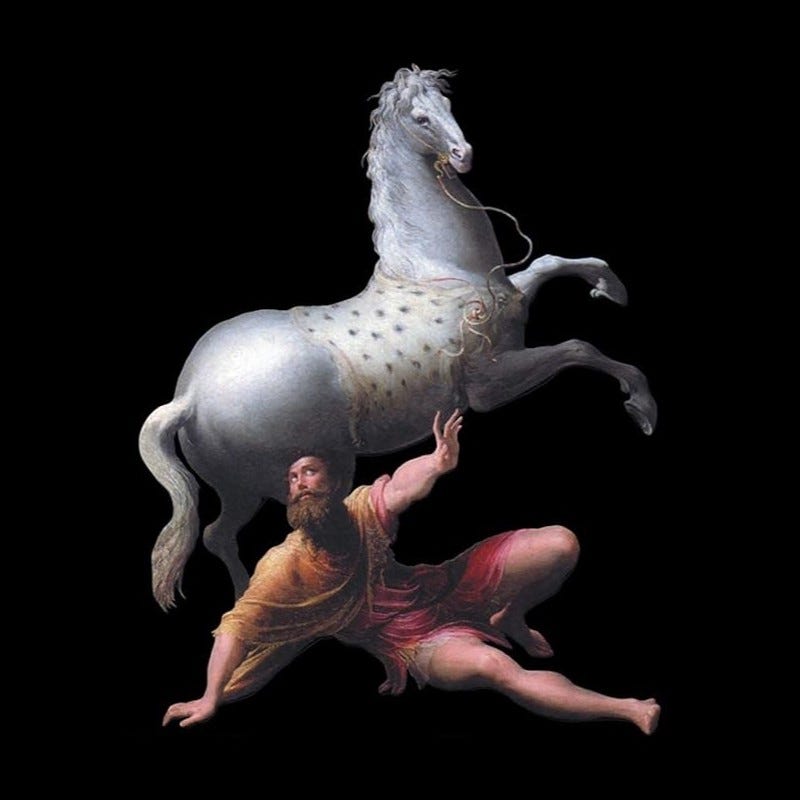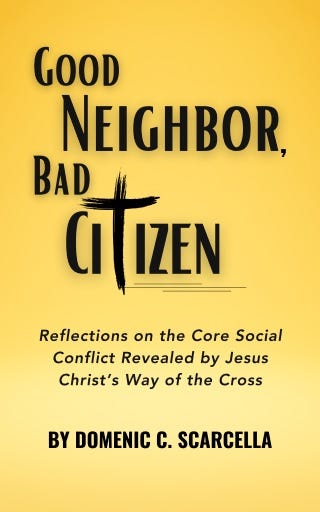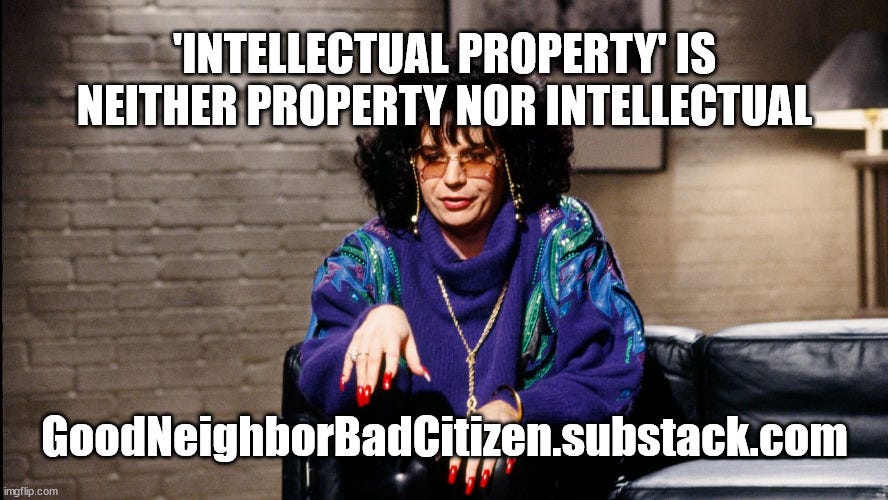Articles in the Rene Girard series:
Part I — Ancient Memes & Modern ‘Lawfare’ [YOU ARE HERE!]
Part II — Simple Things Replicate; Complex Things Grow
Part III — Antivirus Mindware
Part IV — ♪♫ ‘We Built This City …’ ♪♫
Part V — Jesus Christ, Memelord?
Part VI — Does God Accept You As You Are?
Part VII (Series Finale!) — Christmas: More Than ‘Wonder & Awe’

I think this is a surprisingly modern book, in the sense that it’s basically about memes.
If you’ve used social media, you’ve probably seen memes: simple, pithy posts with a few words and often a graphical component. Personally, I find memes to be almost always dull and shallow. But I don’t deny that they’re popular, and I do enjoy the rare one that manages to be sharper than dull and therefore probably funny.
First popularized by British evolutionary biologist Richard Dawkins in his 1976 book, The Selfish Gene, the term “meme” refers to cultural replicators — simple ideas that spread from person to person — the way genes are biologically material replicators.
So, memes didn’t originate with hyper-technological social networks, but they’ve certainly adapted well to the digital environment.
Memes have been at work for all of recorded history and likely for all of pre-history. And while Dawkins gave language and life to the concept, the Frenchman Rene Girard presented the deepest and broadest exploration of the cycles of “mimetic” (meme-driven) activities.
And Girard’s insight emerged thanks to Christianity!
Anthropology, ‘the science of humanity’
Girard’s broadly anthropological approach took him through classic literature and ancient mythology, discovering what he thought were the roots of sacrifice, scapegoats, and civilization. But finally landing on the Bible revealed something Girard initially didn’t expect: a peaceful counter-attack against mimetic cycles of violence, culminating in the Gospels.
Arguably Girard’s most important book is 1999’s I See Satan Fall Like Lightning, the title of which is an allusion to a phrase attributed to Jesus (Luke 10:18). I read and discussed the book for my return appearance to the “History Homos” podcast (Sep. 15 episode, at Spotify, Rokfin, Odysee, Rumble, Bitchute, and here on Substack!).
The excerpt that opens this article is the first thing I said about the book on the podcast.
I’m mulling a series of articles on Girard’s theory — the book and podcast were that informative and enjoyable for me! — but wanted to introduce the show and book as soon as possible this week with a general overview.
And it also allows me to broach another topic that’s been in the news recently: government-granted copyrights and the legal battles (a.k.a. “lawfare”) taking place.
Political privilege masquerading as human rights
I read Girard’s book at the Internet Archive site through their controlled digital lending, or CDL, program. This practice of lending out digital copies of books only if there are unloaned physical copies in the lender’s catalog, is in jeopardy after a court ruling that could threaten good-neighborly digital sharing in favor of crony-citizen tech aggregation.
And it all hinges on a legal matter called “intellectual property” (IP).
The irony isn’t lost on me that I had barely finished reading about the rampant replication of ideas throughout human history while the online library was on the short end of a court case over the alleged legal ownership of ideas!
I used to favor IP laws restricting someone’s production of materials that contained ideas from other people. This shouldn’t be surprising, since it was only last week that I admitted, “Yes, I Used to Be a Statist.”
My journey toward understanding natural human rights (which I wrote about in my first Substack) made me confront the reality that IP — something promoted to people like me, who’ve created music and books and articles and other forms of expression of ideas — was a government-granted privilege, not a real right.
But, isn’t IP a form of property (it says so right there in the term!)?
A proper understanding of property
The objects in question — ideas — don’t work the way actual, natural-rights-based property does.
Actual property is scarce: There are limits to its overall availability, and one person’s use effectively limits someone else’s access to it. But an idea isn’t scarce; one person having an idea doesn’t stop anyone else from having the same idea.
Actual property is also potentially transferrable (also called “alienable”): One person relinquishes it in order for another person to receive it. But an idea isn’t exchanged in this manner; no one has to give up an idea for someone else to acquire it.
(fellow Substacker Christopher Cook wrote about alienable vs. inalienable aspects with respect to labor and slavery; he was also helpful to my grappling with how that position relates to my views on IP)
To support everyone’s natural human rights to property and to express ideas, is to oppose attempts to politically prioritize and subsidize false “property” like IP.
And to show I follow through on this in my own work, in Good Neighbor, Bad Citizen (Amazon, B&N, Lulu), I deleted the standard copyright disclaimer and instead wrote:
All natural human rights respected. Please support the creators of the artistic and literary works you value.

This doesn’t mean I’m fine with forgeries and lying about work. For instance, it’s good that plagiarists are shamed and shunned in professions and other social contexts where the presenter of ideas is expected to demonstrate proficiency in formulating them.
But as Dawkins, Girard and others have shown, ideas can spread in ways that people can’t control (and, arguably, shouldn’t try to control with systemic violence such as government). Let’s seek something better than IP lawfare and the destructive mimetic cycles that Girard warned about.
One day, I hope to see all of government and government-granted privileges fall like lightning.
Express your ideas in the Comments section
Ever heard of Rene Girard? Richard Dawkins? Their books mentioned today? How about meme theory, or mimetic rivalries/cycles?
[NOTE: I will probably regret asking this 😅] What are your favorite memes?
Where do you stand regarding IP laws and lawsuits? Where do these specific views fall within your more general views about government?
If you were able to listen to it, what do you think of the podcast conversation between Scott, William, and me?
Anything else interest you about this article’s topics?
Let me know your non-scarce, non-alienable thoughts below …
—
Find me on X: https://x.com/GoodNeighBadCit







If I am reading this correctly, you support industrial espionage. Why invent when you can steal? What's the harm? If there is no benefit to innovation, it will be funded to a lesser degree and therefore be less of it. There is a reasonable argument as to the reasonable duration of protection of a process or technological development...
If the scope of your thought is limited to Vanilla Ice stealing from Queen or similar... I don't care.
I'm a fan of Girard and have also been against IP laws for a few decades, I agree that ideas are not property, you can however keep possession of your ideas, by not putting them out, were they can end up in MY head. In other words you own your head and so long as the ideas remain within, they are yours and yours alone.
Society if not helped in the slightest by IP laws, they are a good way to create stagnation.
Have you come across David Gornoski from "A Neighbor's Choice"? He's a huge Girard Fan, I was on his podcast a few times, you would make a great guest and vice versa. https://aneighborschoice.com/